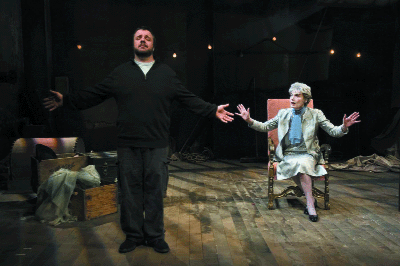Terrence McNally is at top form, as are Nathan Lane and Marian Seldes
With “Dedication, Or The Stuff of Dreams,” Terrence McNally has written a heartfelt, original valentine to three unavoidable and essential components of life—relationships, death, and theater.
In this affectionate and warmly entertaining new play, McNally beautifully renders the harsh realities of each of these elements—especially the theater. In fact, the play suggests––and without too much irony––that, compared to the inherent torments of doing theater, in this case children’s theater, relationships and death are cake.
This is McNally’s most freely written, original play in years, Its lyrical comedy flows from the stage, but he has returned to some of his semi-absurdist roots, with a flourishing maturity that embraces rather than resists the struggles, tragedies, and intermittent triumphs of an ordinary life.
For McNally, this is familiar territory. Once again he is exploring his characters’ egos and their struggles to impose their wills on a world that isn’t made to pander to them. Art is presented as a refuge and a Petri dish—a means of trying to make sense of the whirling chaos of life. McNally pushes the concept beyond theater and opera, two media with which he is affectionately familiar, and examines the limitations of artifice—the theater we each create in our minds as a way of coping by walling off the world. We all, the play demonstrates, live in a theater of our own devising and while that may be as important to our survival as food and water, it is not without its dangers. If we’re not careful, the cure can kill us.
Jessie and Lou, a couple who are not married, but pretend to be, run a children’s theater in a strip mall in an upstate New York town. For Lou’s birthday, Jessie has won the company entry into a decaying theater on the main street of the town, a town by implication whose center has been decimated by strip malls. To get in, Jessie had to lie to the theater’s owner, a rich widow named Annabelle Willard who is dying of esophageal cancer. Jessie said Lou has it, too, and the previously barred doors opened. Meanwhile, the mega star rocker Ida Head, Jessie’s daughter by her first and only husband, is fresh out of her second rehab and has come to make her amends with her technical director/love slave in tow.
Lou believes that if he could get the old theater, he could change children’s lives. Even Ida’s riches aren’t enough, and instead Lou can have the theater and the money to run it only if he makes a Faustian bargain with Mrs. Willard. As he wrestles with that, the cracks in his relationship with Jesse begin to widen and the artifice begins to fall away. Yet, Lou finds that even when hope is stretched thin, healing is possible.
Like the best absurdist theater, none of this makes literal sense outside the world of the play, but in its own internal logic structure, it is perfectly plausible. The complexity of themes addressed is ambitious and masterfully rendered. In the guise of a simple story, McNally’s crumbling theater and the play that unfolds within it become a metaphor for all the decay infecting our culture—the triumph of image over substance, the egocentricity of addiction, the slow poison of hedged commitments, the ease with which we disconnect from those around us, and even urban sprawl. McNally is most keenly interested in our response to all this, our need to play a role, and the inexorable and steep price that demands of our soul.
These are life or death issues, and McNally brilliantly portrays them as such without ever letting us know just how serious the game is—except at the end. When the artifice is stripped away, and the mannered language, costumes, and practiced attitudes are ultimately taken from us, there is simply silence and something as close to truth as we can get as the curtain falls. Our consciousness unfolds gently, along with the characters in a subtle coup de theatre as dramatic as any mechanized stage device.
The cast is phenomenal. Nathan Lane as Lou has been given the most real role he’s had in years, and he does an extraordinary job. He inhabits the character with a clarity and fragility that juxtapose the quasi-brash children’s theater impresario with the wounded child who lives within him. Marian Seldes as Mrs. Willard delivers yet another superlative performance that radiates with ease, honesty, and artistry that outshines most other actors working today. Alison Fraser is excellent as Jessie. R.E. Rodgers is sweet as Edward, Mrs. Willard’s driver, a former wrestler with a soap opera addiction. Miriam Shor is focused and wonderfully rich as Ida. Michael Countryman is strong as Arnold, the technical director of the children’s theater who loves Jessie, and Darren Pettie is terrific as Toby, Ida’s preppie-turned-punk boyfriend. Toby is irresistible even as he is used, and emerges as the emotional center of the play, the most conscious of all the characters because he has chosen to be where he is.
The theater doesn’t save lives; the commitment to telling the truth does. Healing depends on finding the true art amidst the artifice and having the courage to walk out into the world as we are, with all our longings, flaws, unresolved issues, and vulnerabilities and then see what happens. That is, as Lou finally comes to realize, where reality ultimately resides.
gaycitynews.com



































